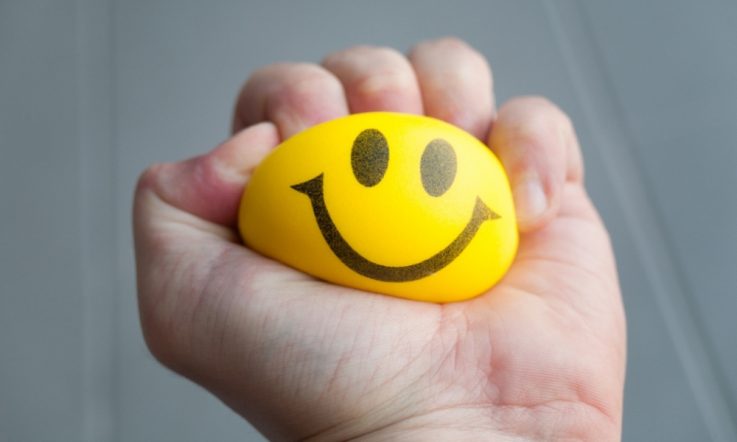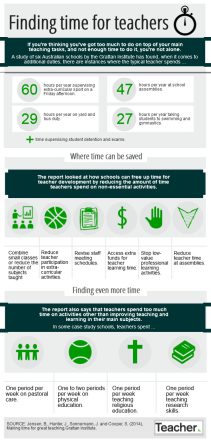Earlier this year, we reported on a project promoting evidence-informed approaches to support staff wellbeing. As a follow-up, we head to the Queensland coast, to find out how two of the schools involved are responding to the challenge.
'Lots of fun and laughter' is Sandy Boardman's verdict on the activities at Brisbane's Moreton Bay College (MBC).
Its staff wellbeing program is designed to remind staff of how much they are valued and how important their own wellbeing is. Simple gestures such as popping a chocolate in everyone's pigeon hole, and events like the Friday Reverse Park Challenge, and Week of Wellness are putting smiles on faces and building collegiality.
Boardman is chairman of the Staff Wellbeing Committee at MBC, set up when the school joined the Independent Schools Queensland (ISQ) Staff Wellbeing Project. The three year project, which ran until last year, saw the peak body provide support in the shape of professional development and funding for schools to develop their own strategies and approaches.
Despite external funding ending in 2014, MBC has continued the program this year.
Boardman says the journey began with a staff survey, the results of which reflected that everyone has different ideas on 'wellbeing'. Staff were also asked for suggestions on how the school could offer support.
Over the last two years, activities have included special morning teas, head and neck massages, tea parties, staff outings, and the development of a wellness brochure for staff which is now given to all new starters. There have also been PD sessions exploring research on the dimensions of wellbeing.

Image © Shutterstock/Horiyan
While some activities have been organised by the committee, others have been impromptu events staged by staff members - such as the challenge to reverse into a staff car park.
'[That was] absolutely spontaneous, undertaken by one teacher, then another, then some more,' Boardman says. 'We are still reverse parking on a Friday and we have a trophy for Parker of the Week. Sometimes they come out with the fluorescent vests on and batons and they try and help you reverse park. It's lots of fun.'
Food has also been a successful way to bring staff from different year groups and faculty areas together. MBC's Feeling Fine in Week 9 Week of Wellness kicked off with More-ish Monday, where staff were invited to bring in a plate to share at morning tea. They have also enjoyed a multicultural week with themed food and decorations from Japan, Thailand and India.
Just down the road, Moreton Bay Boys' College (MBBC) is also supporting staff wellbeing. It became involved in the ISQ project in 2013 and its main focus has been on the physical, occupational and nutritional dimensions of wellness.
Mary Youngman is Primary Years Program coordinator at MBBC and a member of the college Wellness Committee. 'After the initial [ISQ grant] our Senior Leadership Team agreed to continue to fund this committee as they deemed it invaluable to assist staff in their wellbeing,' she tells Teacher.
MBBC also started with a staff survey to find out about people's wellbeing worries. Fitness and stress levels were highlighted as particular concerns. 'Staff made suggestions about strategies to address these issues and these were then acted upon by the committee,' Youngman says.
Activities at MBBC have included installation of coffee pod and drink machines, arranging for planning release time, weekly staff celebration awards, welcome packs for new staff, and availability of a professional counselling service.
New starters are also invited to make suggestions, one of which has been the introduction of an optional staff game that takes place once a term. There's already been a scavenger hunt and a game where players have to pick a colleague's name out of a jar and do an anonymous good deed for them within a set time limit.
Meanwhile, in the Hunger Names, all the players' names were put in a jar and staff invited to pick out a 'target'. To eliminate their target from the game, they needed to get them alone in a room and say 'You've been sent to District 12'.
As well as being fun stress relievers, Youngman says the staff games have also caught the attention of the students. '[With the Hunger Names] the boys saw something was happening and asked if they could assist. Some boys brought walkie-talkies to school so that they could warn their teachers if someone was coming.
'On other games or staff activities the students have become curious and then have seen first-hand how staff can work together in recreational games.'
Schools taking part in the ISQ project have been sharing their strategies and experiences. Teacher asked Youngman for three tips for setting up a staff wellbeing program. They are:
- Get your school leadership team involved and on board. Let them see the research about how improving staff wellness equates to less staff stress and more productivity;
- Outline the rationale to staff about the importance of staff wellness and make involvement voluntary in the initial stages; and
- Let the staff members involved have an input into what they want to happen; what they need for their wellness.
She says the wellbeing focus at MBBC is not only benefiting staff, but the entire school community.
'Happier staff create more conducive, less stressed learning environments for students and this equates to students being less stressed and more engaged.'
Does your school have a staff wellbeing strategy?
Are staff invited to put forward ideas and activities to support teacher wellbeing?



